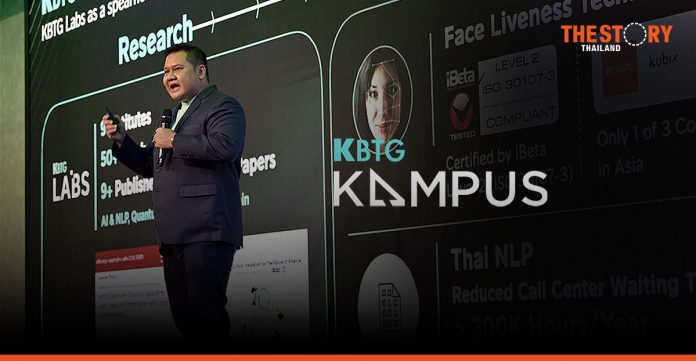KASIKORN Business-Technology Group (KBTG) has expanded the ecosystem of its Tech Kampus project beyond allied academic institutions and the classroom, allowing students and general public members to prepare for their future careers through upskilling and reskilling.
KBTG Group Chairman, Ruangroj “Krating” Poonpol, says Tech Kampus has a vision of strengthening Thailand’s research and technology ecosystem. According to him, KBTG is essentially a strong Thai tech company aiming to become a leader in Southeast Asia.
Since its birth three years ago, KBTG has been well aware that its strength and progress depend on the health of Thailand’s technology ecosystem. The company can go as far as Thai technology and research progress. That inspires KBTG’s vision, which is to help strengthen the Thai ecosystem of technology and research because the company is part of the system.
At the heels of the Covid-19 crisis and an economic recession, a golden age in Southeast Asia is expected over the next decade. This means a massive opportunity for Thailand that comes with big challenges as well. This is because the country’s technology capability is still behind many of its neighbors.
Thailand is ranked 66th in the world in terms of mathematics and science capability. The number of Thai students in science, technology, engineering and mathematics (STEM) is fewer than that of Vietnam, Singapore, Indonesia and Malaysia while Thailand’s wages are three times higher than Vietnam’s.
Southeast Asia’s golden age is driven by technology while Thailand is facing massive challenges regarding technology and the ecosystem.
KBTG focuses on four components of Thailand’s technological ecosystem — company, startup, research, and education. KBTG as a company must be efficient and strong. There must be a shining ecosystem for startups, with quality research serving as the country’s technology backbone. Furthermore, Thailand needs an educational system that can create researchers able to come up with workable projects, as well as more startup companies and technologists for the industry.
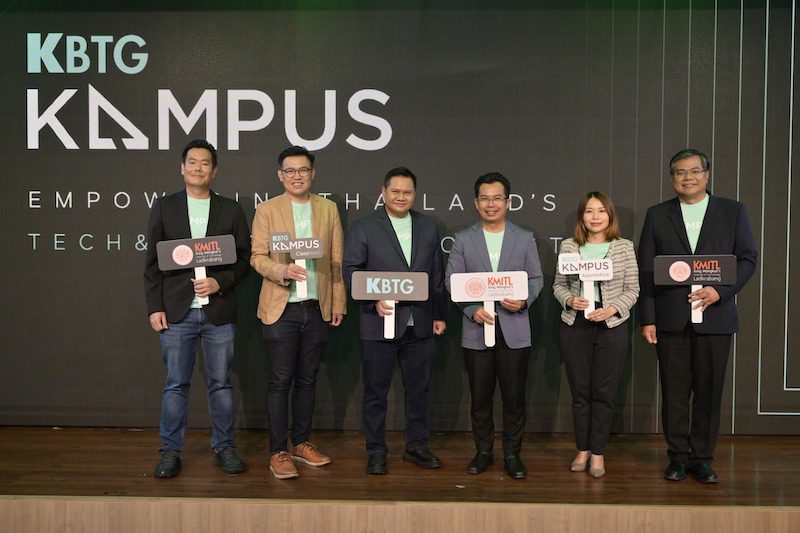
Devoting to education over past 2 years
KBTG Labs has worked with nine institutions and more than 50 researchers on research work with commercial potential. Nine research projects have been published in international journals regarding such technologies as artificial intelligence, quantum computing, and blockchain.
Some research projects have been turned into commercial products, including face liveness technology, which is adopted in a Kasikornbank product with more than 10 million users. Another research work that has been used commercially is Thai NLP, which becomes part of Kasikornbank’s call center and has helped to reduce the customers’ waiting time by 300,000 hours so far.
“We work with nine institutions and 50 researchers to turn research work into actual products that meet international standards,” Ruangroj said.
In addition to research, KBTG is also involved in education — helping employees reskill/upskill through 17,000 online learning and in-house training courses, covering topics ranging from languages to technical matters, such as software engineering and business analysis.
“KBTG is like a small university or research institution where our people and outsiders come to learn,” the chairman said.
Some courses have been made available to non-employees, including KBTG Reskill Classes or DevX Meet Up and KBTG Inspire, which have been held as a mini course and mini bootcamp. Over the past two years, more than 20 such courses have been organized, with over 14,000 participants and 30,000-plus hours of reskilling.

KBTG experts were sent to teach at 11 universities, and they had more than 1,000 students altogether.
The company also has scholarships for its employees. A new data scientist who graduated in petroleum engineering won a KBTG scholarship to study at Carnegie Mellon University on data science and software engineering.
“We believe that graduates of irrelevant degrees can be reskilled to work at KBTG and further their studies at world-class universities. This is what we are doing, creating an ‘academic runway’ for Thailand’s workforce,” Krating said.
KBTG has invested tremendously in education but the chairman says more needs to be done. A digital revolution is taking place all over the world due to pressure from the Covid-19 crisis. Many countries have managed to shorten the time needed for digital development — for instance, from five years to only a year for Indonesia and from two to one in Vietnam’s case.
A workforce of 1.1 billion people across the world, or a third of workers in the tech sector, will have to undergo a technological transformation in the next decade. These people need reskilling urgently. However, the average investment in education is only $140 per person per year, which is insufficient, leaving a large gap for reskilling.
“If you look for a crisis, you see a crisis. If you look for opportunity, you see opportunity,” Krating said.
For many people, an ageing society is like a “time bomb” for Thailand, but it also creates massive opportunities for food tech, health tech, urban tech and fintech that cater to the silver economy.
“With massive opportunities, there is a vast demand for talents to fill the gap.”
Moreover, as all industries want to transform into tech firms, there will be a massive demand for tech jobs in Thailand.
“When we look for talents in the US, some people asked what kind of person KBTG wants. Our answer was that they had to ask what kind of people we did not want. It’s because we want people for all jobs, including cyber security, business analyst, product UX/UI, QA, data scientist, blockchain engineer, data engineer, software engineer, and many more,” Krating said.
KBTG alone wants 1,000 more people. Now there is a shortage of digital workforce. About half of the software developers in the market need reskilling. By 2026, an estimated 12.5 million software developers around the world will have skills that do not meet market demands. Of those, about 1.5 million per year are new graduates.
“All skills are insufficient. A nationwide search has failed to meet the demand. That’s why KBTG is doing this project,” said the chairman.
Thailand has only three startup unicorns, with a big gap from some 50 in all of Southeast Asia. According to Ruangroj, KBTG aims to strengthen the country’s technological and research ecosystem with its partners, which are among the best in Thailand and the region. KBTG Kampus is upgraded to serve as a tool for KBTG to boost the strength of the tech and research ecosystem.
3 core programs of KBTG Kampus
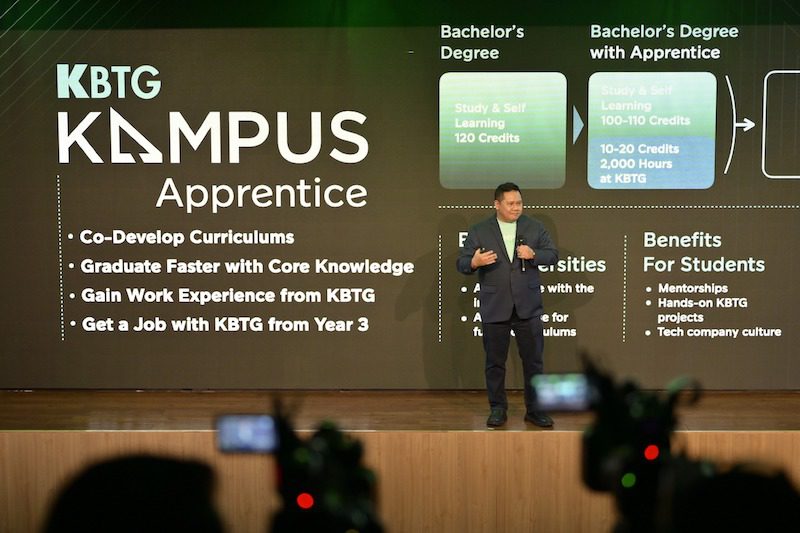
KBTG Kampus has three major programs — KBTG Kampus ClassNest, KBTG Kampus Apprentice, and KBTG Kampus Co-Research.
The KBTG Kampus ClassNest program involves courses on tech skills, such as java software engineering and cyber security. The free courses, some of which have over 600 applicants, include hands-on workshops and close consultations.
More courses on skills required for the 21st century will be added, including data engineering, data science, digital project management, UX/UI, full-stack development, and blockchain. The goal is to increase the number of tech talents by 30 percent, or about 3,000 people, per year, and double the existing number in three years.
Under the KBTG Kampus Apprentice program, KBTG hires senior (fourth-year) students with the same salary as new graduates. They get work experience while gaining the academic credits required for graduation.
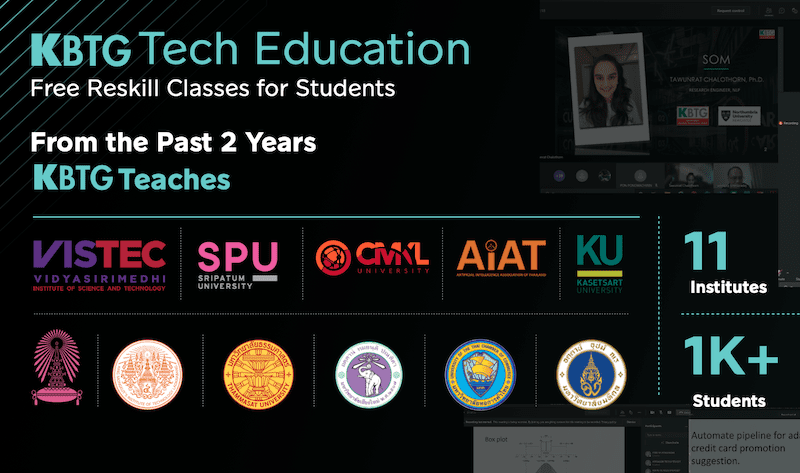
KBTG’s joint program with King Mongkut’s Institute of Technology Ladkrabang (KMITL) is its first one with any university, according to Ruangroj.
“This way, we help increase Thailand’s capacity of producing new workforce by 25 percent. Universities can save a fourth of their time in producing graduates for the labor market,” he said, adding that the collaboration with KMITL is a pilot project.
The third program is KBTG Kampus Co-Research involving the company’s cooperation with leading research institutions both inside and outside of Thailand. The goal is to develop new technologies and create a world-class research ecosystem in Thailand. For instance, KBTG is working with MIT Media Lab, a research laboratory at the Massachusetts Institute of Technology, to develop technologies that can be applied to Thailand.
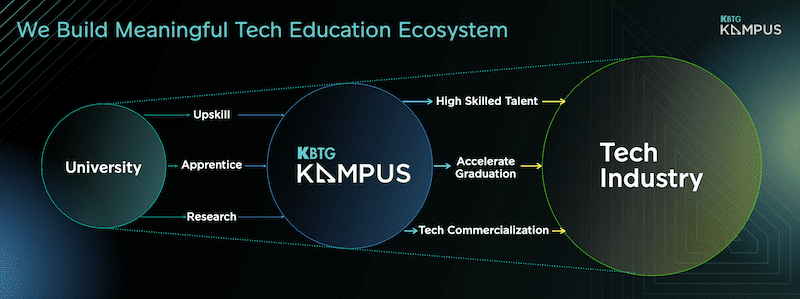
KMITL is collaborating with KBTG Kampus in the three programs — KBTG Kampus ClassNest, KBTG Kampus Apprentice, and KBTG Kampus Co-Research.
The goal is to produce as many as 100,000 tech talents for Thailand by 2030, according to Ruangroj. He added that KBTG alone can only produce 1,000 per year.
“I would like to invite research institutions, universities and corporations to join us in building a technological and research ecosystem, edtech, and tech talents for Thailand. Let’s help Thailand increase its potential to become a global technology hub and a regional leader in this golden age for Southeast Asia,” the KBTG chairman said.
KBTG and KMITL share the same direction
Assoc Prof Dr Komsan Maleesee, acting president of KMITL, said its goal is to become a “world master of information” by 2040, focusing on advanced research that can be used in real life. Many of such research studies were published in world-class journals but never developed into products. KMITL will focus on working with the private sector in developing innovations and technologies.
KMITL aims to produce 1,000 innovations from 1,000 projects and 1,000 ideas through collaboration between its more than 2,000 researchers and relevant industries, according to the institute’s president.
The KMITL Life-Long Learning Centre (KLLC) is set up to improve the skills of students to prepare them for future demands from the industries. Collaboration between KMITL and KBTG involves the improvement of new skills from existing knowledge through upskilling and reskilling.
KLLC offers 97 online courses that are a collaboration between the university’s faculties and colleges and the private sector. Its website has recorded more than 1.44 million visits, with over 22,000 registered members.
“KMITL is studying skills of the future for various industries. We want to use this knowledge to design curriculums in response to industry demands. We are a platform that encourages students to work as a team in improving skills and creating innovations through online courses and workshops,” Dr Komsan said.
According to him, KMITL students can suspend their studies if they want to go ahead with their startup projects before graduation, as their credits earned can be saved in the “credit bank”.
KMITL is working with KBTG on many projects that serve as a good example of collaboration between academic institutions and industries, which eventually brings benefits to students, the president said. “Our goal is to create an academic ecosystem that is able to create a great number of tech talents for the country.”
Assoc Prof Siridech Boonsang, dean of KMITL’s Faculty of Information Technology, said that the KBTG Kampus Apprentice program offers the participating students an experience that they cannot find anywhere else. For him, research questions from the industries are up-to-date and studies trying to answer those questions are also up-to-date.
Meanwhile, KBTG Labs’ Managing Director, Thadpong Pongthawornkamol, said that the collaboration between KBTG and academic institutions brings about three Ps — product, process and people. KBTG can make deep tech products for the world market. A proper process can be developed to keep the value chain going as more products are produced. And people involved can improve their skills as researchers and businesses work together.
For Ruangroj, Thailand can become a hub of technology industries that is capable of producing a workforce for the world market. “KBTG’s principle is that we build things that do not exist now. The benefits do not fall on KBTG only, but also the whole country,” he said.
There have been six KBTG Kampus apprentices involved in research studies that can be used by millions of people, according to him. “If we can increase the number, we will create more impact.”
At KBTG, the five most sought-after tech talents are software engineer (mobile/application/blockchain), cyber security specialist, business analyst, data engineer, and automation test engineer.
KBTG organizes regular roadshows that allow its executives to meet with tech talents in the country and overseas. The company also works with leading agencies domestically and internationally on research and development. KBTG Kampus is looking for more allies in producing more tech talents for the market.
“KBTG Kampus is not built for KBTG’s benefit only. We want to create a tech ecosystem for Thailand to improve the skills of tech talents,” Ruangroj concludes.



